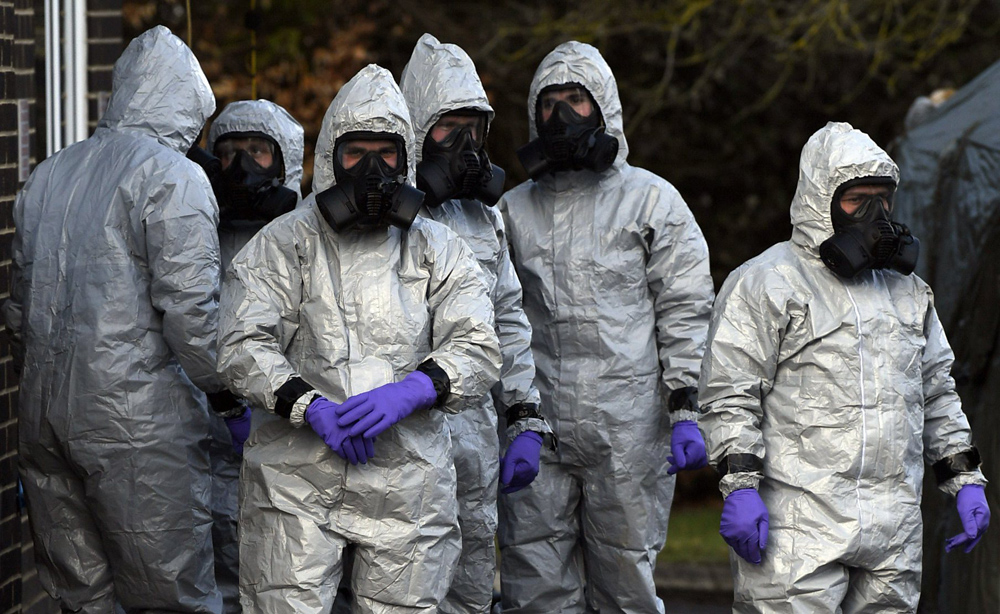Nearly anybody could have tried to murder ex-Russian spy Sergei Skripal and his daughter Yulia with an exotic nerve weapon in Salisbury, England, on March 4. Though it wouldn’t look that way at first glance.

Novichok, the poison used in the attack, was developed by the Soviets in a sophisticated workaround of the Chemical Weapons Treaty, and may be both undetectable and able to defeat standard protective equipment — nothing you could pick up at the hardware store.
And certainly, the Russians had a grudge against Skripal — who as a Russian military intelligence officer worked for MI6 — and an incentive to make an example of him.
So British Prime Minister Theresa May seemed to be stating the obvious when she said it was “highly likely” that Russia was behind the attack.
But official and unofficial Russian sources had other ideas, blaming:
Bill Browder
Bill Browder is a businessman who has advocated for Magnitsky Acts (which target the investments of alleged human rights abusers in various countries, including Canada) in various countries. On March 18, Kremlin spokesperson Dmitry Kiselyov suggested Browder might have been behind the Salisbury attack, along with “runaway Russian oligarchs.”
“The Russians are doing everything they can to try to get me, to try to kill me, to try to stop me, to try to intimidate me,” Browder explains.
Hillary Clinton
This one was inevitable. A bewildering assortment of conspiracy theories have blamed Clinton for this and that, and pro-Russian theduran.com added to the pile this month, arguing that ” … the poisoning of Sergei Skripal leads right to Hillary Clinton and the DNC.” We found it hard to follow the logic, but it has to do with somebody knowing too much about the Steele dossier.
The British themselves
Any prominent attack or act of violence will sooner or later be labelled a “false flag” by someone with some agenda or other, and the Salisbury attack is no exception. “The trusted detective question of ‘Who gains?’ points far more plausibly to sinister British state involvement,” Sputnik argued.
The Atlantic Council’s Digital Forensic Research Lab documents how this narrative was amplified by Russian-linked trolls and bots in mid-March.
Why? Well, Russia’s foreign minister suggested it might be to “distract from Brexit.”
WATCH: British Prime Minister Theresa May said on Monday that it was “highly likely” that Moscow was responsible for the poisoning of a former Russian spy Sergei Skripal and his daughter Yulia in the southern English city of Salisbury.

Or maybe …
Ukraine (RT), the “deep state” (Gateway Pundit) or perhaps the United States (Sputnik).
(The British Foreign Office says it has identified 21 separate conspiracy theories about the attack.)
The DFR Lab’s Ben Nimmo puts the theories coming from Russian-linked sources in the context of “… key disinformation tactics of dismiss, distort, distract, and dismay.” The more conflicting narratives there are about an event, the harder it is to tell truth from fiction, and the more likely it is that people will give up trying.

In fake news news:
- In the New York Times, Zeynep Tufekci observes that YouTube’s algorithms tug users into more and more extreme versions of whatever their interests are. Start with Trump, end with right-wing conspiracy theories. Start with Sanders, end with left-wing conspiracy theories. Start with jogging videos, end with videos about running ultramarathons. “YouTube’s recommender algorithm has a bias toward inflammatory content,” she says. “There is no reason to let a company make so much money while potentially helping to radicalize billions of people, reaping the financial benefits while asking society to bear so many of the costs.” She expands on the argument in this Twitter thread.
- In the Atlantic, a story from the creator of Cow Clicker, a Facebook app which he describes as ” … not an impressive work of software … a game whose sole activity was clicking on cows.” Without really meaning to, however, he amassed a detailed database of all the game’s users: ” … if you played Cow Clicker, even just once, I got enough of your personal data that, for years, I could have assembled a reasonably sophisticated profile of your interests and behavior.”
- In the National Observer, Sandy Garossino interviews Caroline Orr, who is the real human behind the must-read @RVAwonk Twitter account. Orr studies toxic social media dynamics and how they affect our culture and politics. A few voters influenced in exactly the right place can have an outsized effect, she points out: Hillary Clinton would have won the U.S. 2016 election if just 80,000 votes had changes in three states.
- At Motherboard, U.S. professor/activist David Carroll explains why he’s suing Cambridge Analytica in the British courts to get them to give him all 5,000 data points in his voter profile.
- “Facebook is under scrutiny for its outsized role in spreading political misinformation. But it’s also a platform where pseudoscience, snake oil remedies, and medical falsehoods are multiply unchecked,” Nidhi Subbaraman writes in Buzzfeed. “Those have received far less attention, despite carrying the potential for immediate physical harm.” She cites the harrowing example of a Georgia man whose final months, as he died of pancreatic cancer, were afflicted by a quack remedy (cabbage juice that caused explosive diarrhea) that he’d seized through a Facebook group.
- In the New York Review of Books, Tamsin Shaw looks at how techniques of digital political manipulation practised by companies like Cambridge Analytica had their origins in psychological warfare tactics designed for the battlefield. “If these technologies are becoming the core of America’s military and intelligence cyber-operations, it looks as though we will have to work harder to keep these trends from affecting the everyday life of our democratic society,” she writes. “That will mean paying closer attention to the military and civilian boundaries being crossed by the private companies that undertake such cyber-operations.”


Comments